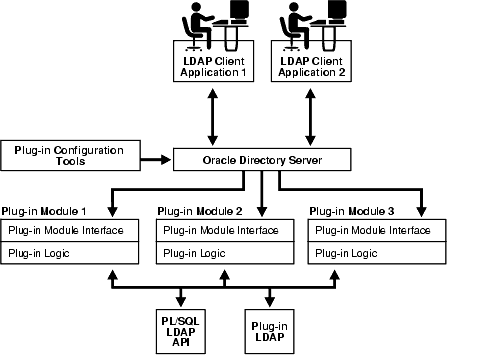10g (9.0.4)
Part Number B12118-01
Home |
Solution Area |
Contents |
Index |
| Oracle® Internet Directory Administrator's Guide 10g (9.0.4) Part Number B12118-01 |
|
Oracle Internet Directory Plug-in Framework, 2 of 3
Directory server plug-ins can provide the directory server with the following kinds of added functionality, to mention just a few:
On startup, the directory server loads your plug-in configuration and library. Then, when it processes requests, it calls your plug-in functions whenever the specified event takes place.
In Figure 45-1, LDAP clients, each using a separate application, send information to and receive it from the Oracle directory server. Plug-in configuration tools likewise send information to the directory server. The directory server sends data to Plug-in Module 1, Plug-in Module 2, and Plug-in Module 3. Each plug-in module has both a plug-in module interface and plug-in logic. Each plug-in module sends information to and receives it from the PL/SQL LDAP API and the Plug-in LDAP.

The work that plug-ins perform depends on whether they execute before, after, or in addition to normal directory server operations. Table 45-1 explains the various kinds of operation-based plug-ins.
|
|
 Copyright © 1999, 2003 Oracle Corporation. All Rights Reserved. |
|